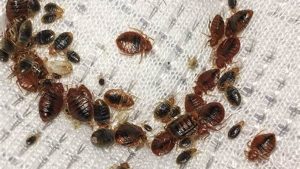Bed bugs are the stuff of nightmares, turning cozy beds into battlegrounds. While professional extermination is often necessary, many people search for DIY solutions like vinegar. But can vinegar really help? Let’s dive into this natural remedy and see how it stacks up against these pesky invaders.
Understanding Bed Bugs
Bed bugs are tiny, elusive creatures that feed on human blood, primarily at night. They hide in mattress seams, bed frames, and even furniture crevices. Signs of an infestation include rusty stains on sheets, dark spots (excrement), and tiny eggshells. Identifying and understanding their habits is crucial for effective treatment.
Why Vinegar?

Vinegar, particularly white distilled vinegar, contains acetic acid, which can disrupt the nervous system of bed bugs on contact. This makes it a potential weapon in the fight against these pests. However, it’s essential to know that while vinegar can kill bed bugs on contact, it’s not a comprehensive solution for severe infestations.
Preparation and Safety Measures
Before you start, ensure you have the right type of vinegar—white distilled vinegar with at least 5% acidity. Protect yourself with gloves and goggles to avoid irritation from the acetic acid. Be mindful of surfaces as vinegar can damage some materials.
Step-by-Step Guide to Using Vinegar
Step 1: Gather materials: vinegar, a spray bottle, and protective gear.
Step 2: Prepare the solution. You can use vinegar undiluted for maximum potency or mix it with water to reduce the smell.
Step 3: Identify infested areas. Look for bed bugs in mattress seams, furniture cracks, and baseboards.
Step 4: Spray the vinegar solution directly onto bed bugs and their hiding spots.
Step 5: Wipe away excess vinegar and any dead bugs.
Step 6: Repeat this process every few days to ensure effectiveness.
Pros and Cons of Using Vinegar
Pros:
- Cost-effective: Vinegar is cheap and readily available.
- Non-toxic: Safe for homes with children and pets.
- Immediate effect: Kills bed bugs on contact
Cons:
- Strong odor: The smell can be overwhelming and linger.
- Limited effectiveness: Vinegar doesn’t kill bed bug eggs and requires frequent reapplication.
- Potential damage: Can harm certain surfaces and fabrics
Supplementary Methods
While vinegar can help, it’s most effective when combined with other treatments. Consider:
- Vacuuming: Regularly vacuum infested areas to remove bed bugs and eggs.
- Heat treatment: High temperatures can kill bed bugs and their eggs.
- Essential oils: Oils like lavender can enhance the repellent effect of vinegar
Real-Life Experiences and Results
Many people have tried vinegar with varying results. Some report success in reducing bed bug numbers, while others find it only offers temporary relief. Experts agree that while vinegar can be part of a broader strategy, it’s not a standalone solution for severe infestations.
Conclusion
Vinegar can play a role in controlling bed bugs, especially in the early stages of an infestation. However, for a complete eradication, it’s best used alongside other methods and professional treatments. Don’t hesitate to seek expert help if the infestation persists.
Frequently Asked Questions (FAQs)
Can vinegar alone eliminate a bed bug infestation?
No, vinegar is best used as part of a broader pest control strategy.
How often should I apply vinegar to see results?
Reapply every few days until you notice a reduction in bed bugs.
Are there any surfaces that vinegar should not be used on?
Avoid using vinegar on delicate fabrics and certain surfaces that can be damaged by acid.
What are the best supplementary methods to use alongside vinegar?
Combine vinegar with vacuuming, heat treatments, and essential oils for better results.By understanding how to use vinegar effectively, you can take a significant step towards a bed bug-free home. Remember, persistence and a multi-faceted approach are key to winning this battle.


